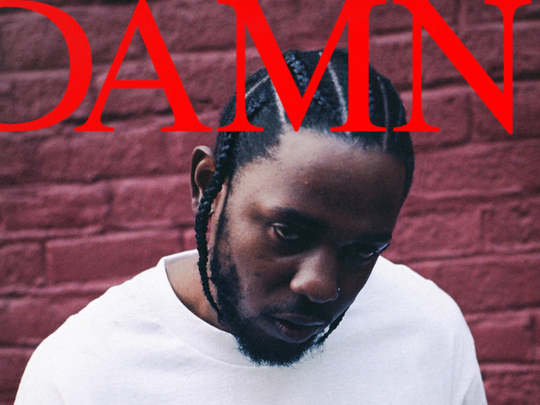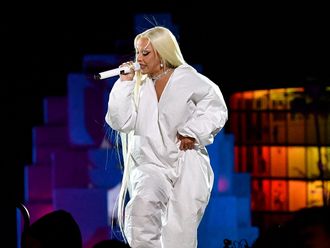
In the weeks before the release of Kendrick Lamar’s fourth album, rumours circulated about its contents. Sources clearly blessed with assorted degrees of reliability informed the world that To Pimp a Butterfly’s follow-up proper would be more commercial than its predecessor, involve “African tribal elements and sounds” and be an album based not around the funk and jazz influences in which To Pimp a Butterfly and the subsequent outtakes collection, untitled unmastered, were rooted, but the harsh, spare sound of trap.
But the most intriguing suggestion came from Lamar himself, who told the New York Times it wasn’t going to be another sprawling state-of-the-nation address: “To Pimp a Butterfly was addressing the problem. I’m in a space now where I’m not addressing the problem any more.”
Like a lot of things Lamar has done over the last couple of years, that seemed suspiciously like an exercise in deflating expectations. Since To Pimp a Butterfly was acclaimed not merely as a great album but a work of vast social importance — lauded not merely by Prince but also by the outgoing president of the United States, and home to Alright, a song that went from hit single to protest anthem, the Black Lives Matter movement’s own We Shall Overcome — Lamar has seemed conflicted about shouldering the solemn voice-of-a-generation tag. And understandably so: it’s one thing being compared to Marvin Gaye or Sly Stone or even John Coltrane, quite another being compared to Mahatma Gandhi, as happened in one spectacularly overheated broadsheet profile.
The sense that Lamar has been trying to shake off some of that earnestness — by handing out guest verses not just to Beyonce and Kanye West but also to flimsy singles by Maroon 5 and Sia, by flogging trainers that he claimed were somehow a “call for unity and equality” — has been hard to avoid. As if to underline it, Damn arrives bearing an old-fashioned backwards message, of the kind seldom heard since the mid-80s furore about hidden calls to satanism and suicide on heavy rock albums. Played backwards, a track called Fear finds Lamar bemoaning “the pain in my heart carrying the burden for the struggle”.
And yet the main differences between Damn and To Pimp a Butterfly seem more musical than lyrical. It takes less than two minutes to reference the Fox News-generated controversy about his performance of Alright on the BET awards, and a couple of minutes more to home in on the subjects of black empowerment and right wing pundit Geraldo Rivera’s absurd suggestion that hip-hop was somehow worse for African Americans than racism. Later, there are suggestions that America is teetering on the brink of apocalypse, that Trump’s victory has left “all of us buried”, talk of “race barriers” and calls for the disenfranchised to “parade the streets with your voice proudly”. It has to be said, for an album that’s supposed to be not addressing the problem any more, it does a pretty good job of addressing the problem on a regular basis.
Despite the presence of Canadian post-bop quartet Badbadnotgood amid a supporting cast that also includes Rihanna and U2, the skronking jazz interludes sprinkled throughout To Pimp a Butterfly — allegedly inspiring the late David Bowie to break out the discordant sax on his final album Blackstar — are noticeable by their absence. BadBadNotGood’s contribution to Lust seems restricted to providing a spectral guitar figure that pans from speaker to speaker somewhere in the distance. It’s beautiful but restrained, certainly not as startling as the sudden appearance on the track of what sounds like a child with a Mancunian accent rapping.
Less obviously haunted by the influence of George Clinton than its predecessor, Damn still sounds rooted in early-70s soul. There are nods towards the luscious, harmony-laden mellowness of the Stylistics and the Chi-Lites (opener Blood even features a warped version of the kind of spoken-word monologue found on the latter’s single Have You Seen Her?), to the stentorian bellow that opens Curtis Mayfield’s If There’s a Hell Below We’re All Gonna Go and to the dense sound of psychedelic soul — by way of Outkast — on Pride.
If it seems a more straightforward listen than To Pimp a Butterfly, there’s a cheering sense that this doesn’t equate to a lessening of musical ambition. There’s none of that album’s wilfully jarring quality — its sudden, anxious musical lurches and abrupt, short-circuiting leaps between genres — but the tracks on Damn still feel episodic and expansive: XXX alone goes from massed harmony vocals to a downbeat rap over glitching, stuttering samples, to a thrilling moment where it explodes in a mass of sirens, screeching tyres and heaving basslines, to a dramatic drop in tempo and an understated guest vocal from Bono in the space of four minutes.
Rather than angsty disruptions, there’s a more subtle sense of disquiet here. The heavy-lidded drift of Yah would sound relaxed were it not for the presence of two grating bass notes that fit with the lyrics’ prickly unease, where images of contented family life rub up against “theories and suspicions”. Meanwhile, on the brilliant Pride, troubled lyrical shifts from modesty and confusion to self-belief — “I can’t fake humble because your [expletive] is insecure” — are mirrored by a rap electronically treated so that its pitch gradually speeds up and slows down amid the woozy atmospherics and falsetto vocals.
Elsewhere, there’s brilliant, dexterous storytelling on Duckworth — the saga of how Lamar’s father narrowly avoided being murdered by a criminal called Anthony, complete with an eye-popping, no-spoilers twist — and another demonstration of Lamar’s nonpareil ability to write songs about the pressures of wealth and success that somehow manage to elicit the listener’s sympathy rather than a roll of the eyes. Fear deals in context, tracing the genesis of his mass of neuroses through the ages.
Whether Damn will have the same epochal impact as To Pimp a Butterfly remains to be seen, but either way it sounds like the work of a supremely confident artist at the top of his game. Kendrick Lamar, it seems, is going to have to live with raised expectations for the foreseeable future.













